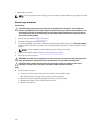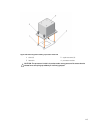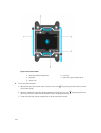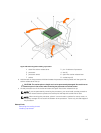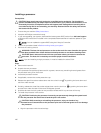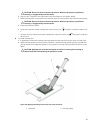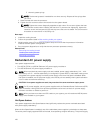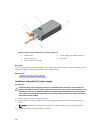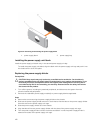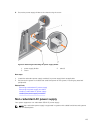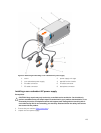
in the sleep state monitors output voltage of the active power supply. If the output voltage of the active
power supply drops, the power supply in the sleep state returns to an active output state.
If having both power supplies active is more efficient than having one power supply in a sleep state, the
active power supply can also activate a sleeping power supply.
The default power supply settings are as follows:
• If the load on the active power supply is more than 50%, then the redundant power supply is switched
to the active state.
• If the load on the active power supply falls below 20%, then the redundant power supply is switched
to the sleep state
You can configure the Hot Spare feature using the iDRAC settings. For more information on iDRAC
settings, see the Integrated Dell Remote Access Controller User’s Guide at dell.com/support/home.
Removing a redundant AC power supply
Prerequisites
CAUTION: Many repairs may only be done by a certified service technician. You should only
perform troubleshooting and simple repairs as authorized in your product documentation, or as
directed by the online or telephone service and support team. Damage due to servicing that is
not authorized by Dell is not covered by your warranty. Read and follow the safety instructions
that came with the product.
CAUTION: The system requires one power supply for normal operation. On power-redundant
systems, remove and replace only one power supply at a time in a system that is powered on.
1. Ensure that you read the Safety instructions.
2. Disconnect the power cable from the power source and from the power supply unit you intend to
remove and remove the cables from the strap.
NOTE: You may have to unlatch and lift the optional cable management arm if it interferes with
power supply removal. For information about the cable management arm, see the system’s rack
documentation.
Steps
Press the release latch and slide the power supply unit out of the chassis.
119




